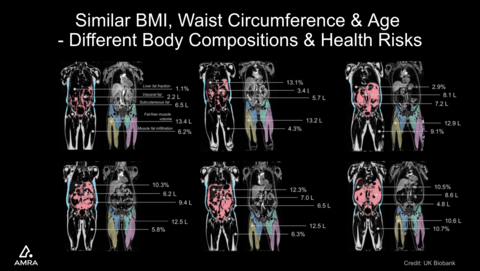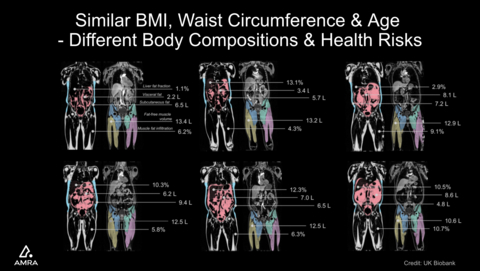LINKÖPING, Sweden--(BUSINESS WIRE)--AMRA researchers together with Linköping University used personalized imaging-derived obesity phenotypes, based on a large, population-based study, to investigate cardiometabolic risk stratification in individuals with obesity.
The study, which analyzed Magnetic Resonance Images (MRIs) from over 40,000 UK Biobank participants, found that the distribution of body fat - whether visceral, subcutaneous, or in the liver - can significantly impact an individual's risk of cardiovascular disease (CVD) and type 2 diabetes (T2D).
The study used ‘body fat z-scores’, describing how much each individual with obesity is deviating from the amount of visceral fat that is commonly observed with their sex and BMI. Results showed that excess accumulation of visceral fat (a high visceral fat z-score) at any given BMI was significantly associated with increased risk of CVD and T2D. Conversely, excess amounts of subcutaneous- and liver- fat was associated with a lower risk of cardiovascular disease indicating a potentially protective fat distribution pattern.
These findings suggest that personalized body fat z-scores may be used as a complement to BMI for identification of high-risk obesity phenotypes that could be considered for intensive obesity treatment options, such as metabolic surgery.
The study underscores the importance of personalized medicine and the need to look beyond BMI when assessing health risks associated with obesity.
The ground-breaking research from this study was selected for presentation at the prestigious annual ASMBS (American Society for Metabolic and Bariatric Surgery) conference in Las Vegas, NV.
“In a competitive group of submitted abstracts, yours was one of the few selected for oral presentation at the 39th Annual Meeting 2023 in Las Vegas, NV, June 25-29, 2023.”
“The ASMBS annual meeting is a leading international conference in the field, and the chance to present in the ‘top paper session’ is very prestigious,” says Torsten Olbers, Professor of Metabolic surgery at Linköping University and one of the co-authors.
“The AMRA technology may help to better personalize the treatment for obesity by revealing the individual's body composition measurements and thereby assist clinicians in understanding medical risk and shift focus away from just BMI,” he continues.
About AMRA Medical
AMRA is a health informatics company at the forefront of medical imaging and precision medicine. The company has developed a game-changing body composition assessment through their whole-body MRI-based technology, which accurately assesses key measurements, such as muscle composition (MFI and FFMV) and body fat distribution (visceral-, subcutaneous, and liver fat). AMRA provides services to support transformative care and vital decision-making, from clinical research to clinical care.
Learn more about AMRA Medical’s MRI-based solutions at https://amramedical.com/solutions or connect with our team of experts for a detailed discussion at info@amramedical.com.




